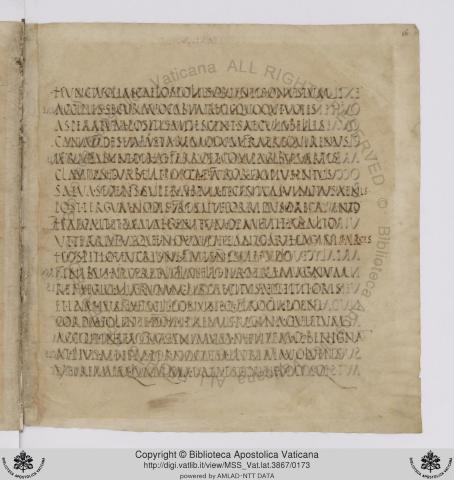CORE VOCABULARY
Māia (dissyll.), ae, f.: one of the Pleiades or seven daughters of Atlas and Pleione, who became by Jupiter the mother of Mercury, 1.297.
dēmittō, mīsī, missus, 3, a.: to send down, 1.297; shed, 6.455; let down into, receive, admit, (of the mind or the senses), 4.428; consign, condemn, 2.85; convey, conduct, 5.29; transmit, hand down, 1.288; dēmittere mentem, to lose heart, sink into despair, 12.609.
altum, ī, n.: the deep; the lofty; the deep sea, the main, the deep, 1.3; the sky, heaven, air, 1.297; from far, far-fetched, remote, 8.395. (altus)
Karthāgō, inis, f.: a city built by Phoenician adventurers on the northern coast of Africa, opposite Sicily, a short distance N.E. of the modern Tunis, 1.13, et al. (Καρχηδών, new city)
hospitium, iī, n.: the relation of host and guest; hospitality, 10.460; friendly reception, entertainment; protection, hospitality, welcome, 1.299; guest-land, ally, 3.15; refuge, 1.540; alliance, 11.114. (hospes)
Teucrī, ōrum, m.: the Trojans, descendants of Teucer, 1.38, et al.; adj., Teucrian, Trojan, 9.779, et al. (Teucer)
nescius, a, um: adj. (nesciō), not knowing, unaware, ignorant, 1.299; that knows not how, that can not.
Dīdō, ūs or ōnis, f.: Dido, daughter of Belus, king of Phoenicia, who fled from her brother Pygmalion to Africa, where she founded the city of Carthage, 1.299.
arceō, uī, 2, a.: to inclose, shut in; restrain, bind, 2.406; debar, keep off, repel, 1.435; protect, save from, 8.73.
volō, āvī, ātus, 1, n.: to fly, 1.300, et al.; of rumor, to be spread rapidly, noised or spread abroad, 3.121.
rēmigium, iī, n.: a rowing; oarage, rowing movement, 1.301; body of rowers, oarsmen; a crew, 3.471; rēmigium ālārum = ālae, wings, 6.19. (rēmex)
āla, ae, f.: a wing, 1.301; the feather of an arrow, 9.578; the wing of an army; cavalry, 11.730; troop, battalion, 11.604; horsemen, mounted huntsmen, 4.121.
atque, or ac: (conj.), and in addition, or and besides; and, as well, and indeed, and, 1.575; freq.; even, 2.626; in comparisons, as, 4.90; than, 3.561.
Libya, ae, f.: Libya; northern Africa; by poetic license, Africa, 1.22, et al.
adstō, stitī, 1, n.: to stand at, near, or upon; alight, 1.301; stand, 9.677; be present, 3.150; stand or be ready, 3.123; impend, 3.194.
ōra, ae, f.: a margin, border, 12.924; coast, shore, 3.396; region, 2.91; rim, extremity, 10.477; pl., outline, compass, 9.528.
iussum, ī, n.: a thing ordered; command, injunction, order, 1.77, et al. (iubeō)
ferōx, ōcis: adj. (ferus), wild; impetuous; ferocious, fiery, fierce, 5.277; warlike, martial; proud, 12.895.
Poenī, ōrum, m.: the Carthaginians, 1.302; Africans, 12.4.
imprīmīs: (adv.), especially, chiefly, 1.303.
rēgīna, ae, f.: a queen, 1.9; princess, 1.273. (rēx)
quiēscō, quiēvī, quiētus, 3, n.: to rest, 7.6; repose, rest in death, 1.249; be hushed, still, quiet, 4.523; cease from action, 5.784; lie, 10.836; p., quiētus, a, um, at rest, quiet, 5.848; still, calm, tranquil, 5.216; peaceful, in repose, 4.379; gentle, friendly, 1.303. (quiēs)
benīgnus, a, um: (adj.), of a kindly spirit; benevolent, friendly, favorable, hospitable, 1.304.


